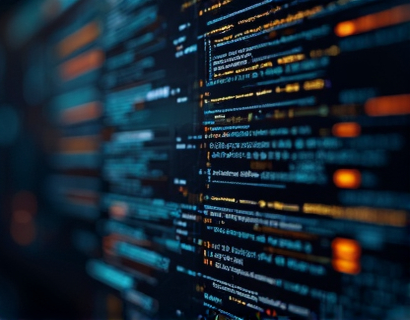AI and Crypto: Powering the Future of Fintech with Intelligent Solutions
The intersection of artificial intelligence (AI) and cryptocurrency is revolutionizing the fintech industry, offering unprecedented opportunities for efficiency, security, and personalization. This transformative synergy is reshaping digital finance, creating a more robust and intelligent ecosystem for users and businesses alike. As we delve into this topic, it's essential to understand the foundational technologies driving this change and their implications for the future.
Understanding AI in Finance
Artificial intelligence, defined as the simulation of human intelligence processes by machines, particularly computer systems, is increasingly becoming a cornerstone of modern finance. AI encompasses various subfields, including machine learning, natural language processing, and predictive analytics, each playing a crucial role in enhancing financial services. In the context of cryptocurrency, AI technologies are leveraged to improve transaction processing, risk management, and user experience.
Machine learning algorithms, a subset of AI, are particularly potent in analyzing vast datasets to identify patterns and make predictions. In fintech, these algorithms can process historical market data to forecast price movements, optimize trading strategies, and detect fraudulent activities with high accuracy. For cryptocurrency, this means more reliable and efficient trading platforms, better risk assessment tools, and enhanced security measures.
Enhancing Security with AI
Security is a paramount concern in the cryptocurrency space, given the decentralized and often anonymous nature of blockchain transactions. AI technologies offer robust solutions to bolster security protocols and protect against emerging threats. One of the primary applications is in fraud detection. By analyzing transaction patterns and user behavior, AI systems can identify anomalies that may indicate fraudulent activity. This proactive approach allows for real-time alerts and immediate action to mitigate risks.
Another critical area is in cybersecurity. AI-driven security systems can continuously monitor networks for vulnerabilities and potential attacks, adapting to new threats as they emerge. This dynamic defense mechanism is particularly valuable in the crypto world, where hackers are constantly evolving their tactics. AI can also enhance the security of private keys and wallet management through biometric authentication and behavioral analysis, ensuring that only authorized users can access sensitive information.
Personalization in Cryptocurrency Services
AI's ability to process and analyze vast amounts of data makes it an ideal tool for personalizing financial services. In the cryptocurrency space, this means tailored experiences for users based on their preferences, behavior, and risk tolerance. Personalized recommendations for investment strategies, customized portfolio management, and tailored alerts for market movements are just a few examples of how AI can enhance the user experience.
For instance, AI-powered chatbots and virtual assistants can provide users with real-time advice and support, answering queries and guiding them through complex financial decisions. These intelligent assistants can learn from user interactions, refining their recommendations over time to better meet individual needs. This level of personalization not only improves user satisfaction but also increases engagement and loyalty to crypto platforms.
Optimizing Trading and Investment Strategies
AI-driven trading platforms are transforming the way users interact with cryptocurrency markets. These platforms use advanced algorithms to analyze market data, identify trends, and execute trades with precision. By automating the trading process, AI reduces the emotional bias that often affects human traders, leading to more rational and profitable decisions.
One key application is in algorithmic trading, where AI systems execute trades based on predefined criteria and real-time market data. These algorithms can operate 24/7, capitalizing on market opportunities that human traders might miss. Additionally, AI can perform backtesting to evaluate the effectiveness of different strategies, allowing users to refine their approaches and maximize returns.
Portfolio optimization is another area where AI shines. By analyzing a wide range of factors, including market conditions, asset correlations, and historical performance, AI can suggest the optimal allocation of assets to achieve the best risk-adjusted returns. This data-driven approach helps users build diversified and resilient portfolios, reducing the risk of significant losses.
Improving Blockchain Efficiency
Blockchain technology, the backbone of cryptocurrency, can benefit significantly from AI innovations. One of the main challenges with blockchain is scalability. As the number of transactions increases, the blockchain can become congested, leading to slower transaction times and higher fees. AI can help address this issue by optimizing block validation processes and improving consensus mechanisms.
For example, AI algorithms can predict network congestion and dynamically adjust parameters to maintain optimal performance. Machine learning can also be used to enhance smart contract execution, ensuring that contracts are executed efficiently and securely. By streamlining these processes, AI contributes to a more scalable and user-friendly blockchain ecosystem.
Regulatory Compliance and Risk Management
The regulatory landscape for cryptocurrency is complex and evolving, posing significant challenges for businesses and users. AI can play a crucial role in navigating this landscape by providing real-time compliance monitoring and risk assessment. AI systems can analyze regulatory changes across different jurisdictions, ensuring that crypto platforms remain compliant with local laws and regulations.
Risk management is another critical aspect where AI excels. By continuously monitoring transactions and user activities, AI can identify potential compliance issues and alert relevant parties. This proactive approach helps prevent legal and financial repercussions, fostering a more trustworthy and regulated crypto environment.
Future Prospects and Challenges
The integration of AI and cryptocurrency holds immense potential, but it also comes with challenges. One of the primary concerns is the ethical use of AI, particularly in ensuring transparency and fairness in financial decisions. There is a need for robust frameworks to govern AI applications in finance, preventing biases and ensuring that AI systems are accountable and explainable.
Another challenge is the technical complexity involved in integrating AI with existing blockchain infrastructure. Developing scalable and secure AI solutions requires significant investment and expertise. However, as the technology matures and more players enter the space, these barriers are likely to diminish.
Looking ahead, the synergy between AI and cryptocurrency is poised to drive further innovations in fintech. From decentralized finance (DeFi) platforms that leverage AI for better lending and borrowing mechanisms to non-fungible tokens (NFTs) that use AI to create unique digital assets, the possibilities are vast. The future of digital finance will be increasingly intelligent, efficient, and user-centric, thanks to the powerful combination of AI and cryptocurrency.
In conclusion, the fusion of AI and cryptocurrency is not just a technological trend but a fundamental shift in how we approach financial services. By harnessing the strengths of both domains, we can create a more secure, personalized, and efficient financial ecosystem. As we continue to explore and develop these intelligent solutions, the future of fintech looks brighter and more promising than ever.










































